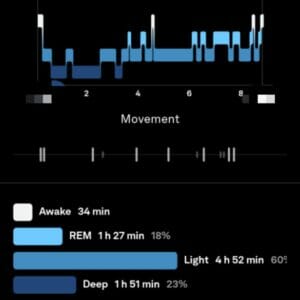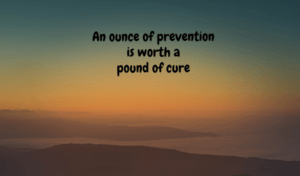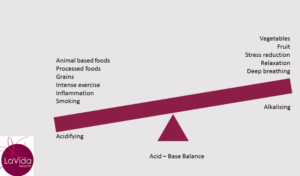It is estimated that approximately 2 million people suffer from insomnia in Australia. This is a shocking statistic when you consider that sleep is vital for life and certainly plays a significant role in our enjoyment of life.
So, why aren’t we sleeping?
Disruption to your circadian rhythm
You’re probably familiar with the term “circadian rhythm”. In simple terms, this is the 24-hour rhythm of the body, largely driven by the presence of daylight i.e. night and day. This rhythm is described as the body’s internal clock which influences your sleep/wake pattern. It drives us to sleep at night and be alert during the day. But not just sleep, it also influences your metabolism, body temperature, hormone production and drive to eat among other things.
It’s easy to see why nightshift workers have disrupted sleep/wake patterns. Their activity and eating patterns go directly against the body’s natural rhythms but as Sachin Panda PhD puts it in his book, The circadian Code, many of us fit the definition of shift workers these days. That is, awake for more than three hours between 10pm and 5am for more than 50 days of the year.
So, staying up late to work, game, party or binge-watch your favourite show (even if only on weekends) is enough to disrupt your circadian rhythm.
Resisting our circadian rhythm (deliberately or otherwise) increases our risk of disease.
The sleep cycle
When you are sleeping well, your body is aiming for approximately five 90 minute cycles (a total of 7.5 hours). During these cycles, we roll through REM sleep into non-REM or deep sleep and back again. But we don’t do this evenly. The first couple of cycles are weighted towards a greater proportion of deep sleep, whereas the latter cycles carry more REM sleep.
Deep or NREM sleep – Ideally, we need at least 1-2 hours of deep sleep each night. This is when our brain does a cleanout and removes the “rubbish”. It is during this time that our glymphatic system is working efficiently to remove toxins from circulation.
REM sleep – Coming in the latter part of your night, REM sleep is when you might dream. It is also during REM sleep that neural connections are made and strengthened. REM sleep ideally constitutes around 2 hours or 25% of your sleep time.
The rest of your sleep time is transitioning between these two vital sleep stages.

What is important to note is that your deep sleep will largely occur between 11pm and 4am while your REM sleep happens mostly between 4am and when you wake. As a consequence, if you are late to bed or early to rise you will be specifically missing out on either deep or REM sleep…and you need both for optimal health.
Common sleep problems
Let’s go through a few of the more common problems frustrating many of the clients I see in my clinic.
Taking too long to fall asleep (sleep-onset insomnia)
You might be familiar with this form of insomnia. You diligently go to bed and turn out the light at a sensible time but you fail to drift off to sleep for what can be hours.
In addition to insufficient melatonin production (see below), here are some of the other common causes.
Physical tension
Tight muscles, particularly if they are painful, may be interfering with your ability to relax and move into a restful state. Check-in with your body. Are you holding tension in your muscles? Sometimes we are so used to it we don’t even realise it.
If this is you, you might benefit from a warm shower or bath or a stretching routine before bed. Perhaps even a heat pack in bed could help. It may also be beneficial to have your calcium, vitamin D and magnesium levels checked as these are all important nutrients for muscle relaxation.
Excessive napping during the day/evening
A quick nap during the day is fine provided you are sleeping well and provided it’s no later than 2pm. It can relieve what is known as “sleep pressure” which results from the build-up of adenosine in your brain. The amount of adenosine you have at any one moment is a reflection of how long you have been awake. The longer you are awake, the higher your adenosine will be. The more adenosine you have the stronger the desire to sleep i.e. sleep pressure.
A short nap of less than 30 minutes can help to relieve sleep pressure but any longer than that and you are likely to achieve a deeper state of sleep (so instead of waking refreshed, you wake groggy). Or you might effectively go through a whole sleep cycle and therefore delay the feeling of tiredness at night.
Excessive thinking/anxiety
Problems need to be solved but they don’t need to be solved in bed!
If excessive thinking or worry is your sleep nemesis, set aside some time during the day (not just before bed) to address your problems. Don’t lie awake thinking about tomorrow, make sure you’ve planned your day well before going to bed. If something pops up, remind your brain that it’s on the list.
When those thoughts arise in bed, remind your brain that you have already thought about them and you have a plan or that you have set aside more time tomorrow to work on them but now it’s time to sleep. Give your mind something else to do by repeating this.
If thoughts creep in (including worrying about not falling asleep), tell your brain “don’t go there” and preoccupy it with other, more restful thoughts.
Waking at the same time every night
This is a very common story. Many of my clients will report that they wake up at the exact same time every night. It seems quite spooky but there are a few possible reasons why this might be happening.
Insufficient melatonin production
As you probably know, melatonin is your sleep hormone. It is produced after dark and peaks around 2-4am. Its role is to signal the brain that it is time for sleep. Insufficient melatonin could be the reason you are waking at this time.
One of the biggest disrupters of your melatonin production is screen time….especially at night. Modern screens produce a frequency of light known as blue light and this blue light is known to suppress melatonin production. LED light bulbs can also do this.
So, this is why I recommend no screens in the bedroom (including phones) and limiting evening screen time. Investing in a pair of blue light blocking glasses may also be necessary.
Some (but not all) people may find benefit in melatonin supplements but in the long term, supporting your own melatonin production is my recommendation (and naturopathic treatment is helpful for this).
Hypoglycaemia
You wouldn’t necessarily think that low blood glucose (hypoglycaemia) would cause you to wake up but it can. Your body continues to use glucose for fuel while you sleep. It’s doing all-important repair and cleaning work getting you ready for the next day. For most people, this does not cause a problem. Their body is very efficient at regulating the glucose in their blood and supplying fuel to vital organs.
However, for some, blood glucose will dip too low overnight. When this happens, your brain perceives a threat and your cortisol will increase as a result. Effectively, your flight or fight system is activated, you wake up and your brain starts looking for “danger”.
To address this, pay attention to what you have for dinner. You may need to add in a small protein snack before bed to help maintain blood glucose overnight. Some blood tests to understand how your body manages glucose may be warranted.
Waking repeatedly or waking too early
Perhaps you feel like you are waking up every half hour or so. Or maybe you wake early and then just can’t get back to sleep. Anything that causes a rise in your alertness hormones, cortisol or adrenaline, will contribute to this problem e.g. a noise, worrying about having to get up early, your pet jumping on your bed.
There are a few other common causes for this problem.
Obstructive sleep apnoea
Your airways get blocked, resulting in a drop in oxygen levels, sending an alarm signal (a rise in cortisol) to the brain to wake up and breathe. This can happen repeatedly during the night. Maybe, the drop in oxygen isn’t enough to wake you but is enough to prevent you from achieving deep sleep, resulting in fatigue and brain fog the next day.
You might suspect OSA if you are a loud snorer or if you’ve been told you stop breathing during the night or if you have high blood pressure. One of the standard screening tools for OSA is the StopBang Questionnaire. Depending on your score, your doctor may refer you to a sleep specialist for assessment and treatment of sleep apnoea.
The effects of caffeine or alcohol
Both caffeine (including some soft drinks and even chocolate, sorry) and alcohol have the effect of inhibiting your ability to get into a state of REM sleep. As a result, you sleep lightly and are more likely to wake early.
Some people can drink coffee and alcohol without a second thought for their sleep. They have particularly efficient enzymes for processing these compounds.
Habit
There may have been a valid reason for your disrupted sleep patterns in the past. Perhaps it was young children, shiftwork, travel across timezones or late-night deadlines. Whatever the cause, it led you to repeatedly have nights where you went to bed late, woke frequently or slept during the day.
Despite the fact that the reason for your disrupted sleep routine is now long gone, the habit remains, perpetuated by your belief that you just don’t sleep well.
Retraining your brain to adopt a new sleep pattern is possible if you are prepared to try.
Excessive thinking/worry
See my comments above.
Not waking refreshed
It’s not uncommon for people to report that they feel like they are sleeping through the night, getting 7-9 hours of sleep but still don’t wake refreshed. They may have difficulty getting out of bed and take a while to feel fully awake.
It is possible that this is due to being woken (by an alarm for example) in the middle of one of your sleep cycles. Suddenly waking from deep or REM sleep (rather than gradually coming out of a cycle) can leave you feeling groggy. If you naturally wake (and feel awake as a result) at a different time to your alarm, you may need to see if you can shift your sleeping hours…even 30 minutes may be enough).
Another possibility is that a shift in when you sleep changes the amount of deep or REM sleep that you are getting. You may be getting 8 hours of sleep but if it is between 2am and 10am (for example), you may be lacking in deep sleep (and therefore not giving your brain the time to do its clean up job).
Here are a few other reasons for daytime fatigue.
Sunday night insomnia
This is another common sleep problem that I see.
It may be due to worry about the week ahead. (See excessive thinking above). If so, spend some time earlier in the weekend to plan your week so that come Sunday night, you can tell your brain it doesn’t need to stress.
Another possible cause is that you have a different sleep routine on the weekends. Maybe you allow yourself to go to bed later and then sleep in. Or perhaps you have a nap during the day. Perhaps this is compounded by a change in your eating/drinking over the weekend i.e. more caffeine or alcohol, more (or less) exercise, richer food, more treats or more takeaway. If this is you, and you want to improve your sleep, then the answer is to keep your weekend routine the same as your routine during the week.
What else could be going on?
Some medications are known sleep disruptors. So if you are taking any medications it is worth discussing this with your doctor. Are they the cause of your poor sleep? Is there an alternative (besides a further prescription for sleeping pills)?
Some health conditions are associated with disrupted or poor sleep.
For example:
- The transition to menopause can be a time of poor sleep due to the effects of changes and fluctuations in hormone production.
- Tinnitus (ringing in the ears) is another issue that may also impact a person’s ability to sleep well.
- Depression (especially if it precedes your sleep issues) is a known trigger for changes in sleep patterns.
- Painful conditions such as arthritis or fibromyalgia make it hard to achieve restful sleep.
- Thyroid dysfunction resulting in abnormal thyroid hormone levels may impact sleep hormones.
- Restless legs are sometimes a result of iron deficiency anaemia.
- Anything causing ongoing stress will impact your regulation of cortisol, melatonin and other hormones.
If any of these are suspected, it is worth investigating and working on resolving them if possible, perhaps with naturopathic support.
How to help yourself to better sleep
There are almost as many causes of poor sleep as there are different sleep patterns. Here are my tips for improving your sleep:
- Address as many of the causes as you can. You will likely get better results if you can address multiple disrupters simultaneously. There is synergy in this approach rather than trying one thing at a time, hoping for a magic bullet.
- One of the biggest causes of sleep loss is worrying about sleep loss. So, train yourself not to worry about sleep loss. Ok, so if you have a bad night’s sleep you might be a bit tired the next day but it’s not a disaster. Remind yourself that your body is resting peacefully and you will likely be going in and out of sleep on the sleep waves even if you don’t realise it at the time. I can see this in my sleep tracking data. When I think I have had a bad night’s sleep I am almost always surprised to see my sleep data is better than I was expecting.
- Track your sleep and become your own experiment. You can use a simple sleep diary or a tracking device such as the Oura ring. Doing this helps you to learn your own unique patterns; how much sleep you need and what disrupts your sleep.
- Be patient. Don’t expect a long-standing sleep issue to resolve overnight just because you have made lots of changes to your lifestyle. It may take a month or more for your body to gradually readjust and it is likely that daytime energy will be the last thing to improve.
What else can you do?
Bear in mind that everyone is unique. You may not follow the patterns of good sleep perfectly and that is ok. Your goal is to optimise your sleep to meet your unique needs based on your biochemistry and genetics. It starts with awareness and acknowledgement of your behaviours and making adjustments over time to move you closer to your goal.
If you want to learn more about how you can reset your sleep you could look at the following resources.
The Insomnia Answer – a self-help book by Paul Glovinsky and Arthur Spielman
Sleepbetter.com.au – a downloadable sleep program
And if you want my help (and that of my wonderful sleep herbs and supplements) to identify your triggers and help you with a strategy for better sleep, I am only a call away.





